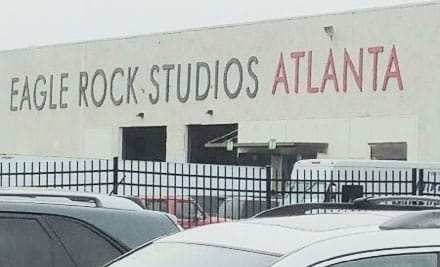

Howard went on to say, as she spoke to movers and shakers from throughout the county, “I encourage each of you to decide how you’ll be a part of the film industry here in Gwinnett.”
Rocket IT’s founder and CEO Matt Hyatt told the packed room Friday that “the whole country, the whole world, is watching Gwinnett County because of the film industry here.” Rocket IT was the presenting sponsor of the event.
Howard Mavity, of the law firm Fisher and Phillips, LLP introduced Friday’s keynote speaker Lee Thomas, but before he did, he explained that his firm deals with labor management matters, OSHA issues and more with respect to the film industry. With respect to Thomas and her credentials, Mavity said, “She is well suited to know what Gwinnett needs, and what the state needs,” in knowing what will keep Georgia third (or better) in the film industry in the United States.

The trend began years ago when Canada began offering incentives to film companies, thereby pulling filming business away from the United States and into Canada. That meant that real dollars, and a lot of them, were leaving the U.S. and being spent north of our border. Georgia began offering incentives in the early 2000’s, but they were so complicated that they did not have the impact that lawmakers intended. In 2008, Georgia legislators streamlined the incentives, making them easier to understand and utilize. Those incentives have remained strong, thanks to lawmakers, and Georgia is now one of the best models in the country for incentive design and usage.
Currently, filmmakers receive a 20 percent tax credit, and an additional 10 percent credit for showing the Georgia logo in film credits. In addition, filmmakers must spend locally at least $500,000 a year while filming in Georgia.
“The film business in Georgia began in 1972, when Deliverance was filmed here,” Thomas said. Then-president Jimmy Carter saw the positive economic impact that the project had on the economy, and he was the first to recognize the importance of courting the multi-billion dollar industry.
Why do filmmakers choose Georgia as a favorite location?
Policy makers have worked hard to make Georgia a favorite spot for decision makers in the film industry. Incentives are a big reason that movies and shows are filmed here. A top-notch infrastructure, temperate climate, highly-skilled workforce, diverse shooting locations and of course, Hartsfield-Jackson Atlanta airport are also big draws. Over the past few years, big studios and stages have been built to accommodate the needs of filmmakers, as well as those producing reality shows, TV series and TV movies.

Two hundred-forty-four productions were created here last year. Those include films, TV movies and series, commercials and videos. That translates into $1.7 billion spent here, and a $6 billion economic impact. That financial impact means jobs, sales of materials and goods, and a big boost for the hospitality industry (hotels, car rental companies and restaurants). But it also means that florists, dry cleaners, construction contractors and subcontractors, and almost every other industry benefits, and those who need those products and services don’t mind paying for them.
MPAA (Motion Picture Association of America) companies alone spent $623 million with 5,455 Georgia vendors in 2013. Since 2009, those same companies have paid an average of $660 million per year to local companies. MPAA is responsible for more than 79,100 jobs and $4 billion in total annual wages in Georgia. Those jobs pay an average salary of nearly $84,000 per year, 75 percent higher than the average salary nationwide.

What’s coming in Georgia’s future with respect to the industry?
An exciting new partnership between universities and technical colleges in Georgia, and the growing film industry here, offers fast-track certifications that will qualify Georgians to work in studios and on sets, working on production, visual effects, gaming production and various other fields that are emerging in the entertainment industry, all swirling around film. In fact, many say that Hollywood is moving to Georgia, because doing business in Georgia just makes more sense than filming in many other states and locations. Having “homegrown” talent from which to pull just makes Georgia that much more attractive to decision makers in the industry.
The OFS property located in Norcross is becoming a busy hub for filming in Georgia; in fact, the film industry has beefed up business for OFS itself. The former location of Bell Laboratories and, later, Lucent Technologies, OFS’ business is going strong in the midst of a film studio and lot that, very recently, had three films in production at the same time.
Jim Jacoby, CEO of Jacoby Development (the 6 million sq. ft. Atlantic Station developer), plans to develop a campus of the same size around OFC that will include housing for film production students and established film industry professionals, studios and offices. “Everything will be right here, making Gwinnett an even more attractive location for filmmakers,” Jacoby said. “We’re looking to bring exciting new media companies here.”

“We have to take care of these folks,” said Thomas, referring to the film industry. “We need to continue to offer them the same hospitality that they have come to expect here in Georgia, to keep them coming back.”

